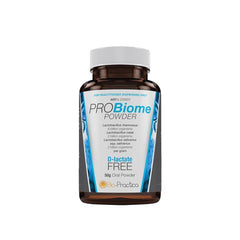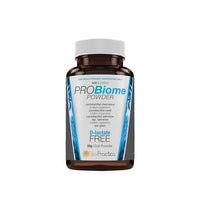Bio Pratica Probiome Powder
To gain access, login, then complete the below form or script upload.
Sorry, we need a little more information before we can grant access to this product.
Practitioner only products are only available to Mr Vitamins members.
Sign in or join for free now to personalise your experience
Free 10 minutes phone consult
Please select a convenient time for us to call you back or, select ‘next available for the soonest possible response.
We will send you an email to reset your password.
Terms and Conditions
Frequently Purchased Together

Bio Pratica Probiome Powder
${ frequentlyBoughtProduct.title }
 Free Shipping Available
Free Shipping Available
 Free Click & Collect
Free Click & Collect
 Free 10 min Consult
Free 10 min Consult
This is a practitioner strength product and must be dispensed under the care of a qualified Naturopath.
Practitioner only products are only available to Mr Vitamins members. To access, complete the health survey below, and a member of our team will review your case prior to dispatch. Sometimes one of our Naturopaths may need to make contact to confirm whether this is the best product for you If you already have access, it will appear after you sign-in.
Description
Bio-Practica ProBiome Powder is D-lactate free contains highly therapeutic, scientifically documented probiotic strains, which are safe and effective for all ages. The beneficial strains in PROBiome POWDER (D-lactate free) do not produce D-lactate. D-lactate is a form of lactic acid. Lactic acid build-up may impact intestinal permeability and a ect the survival of beneficial flora.
- Contains 10 billion CFU per gram.
- Supplementation with PROBiome POWDER helps to maintain and stabilise healthy gut microflora populations, without adding D-lactate to the gastrointestinal environment.
- The impact of D-lactate accumulation in the gut.
- Most the body’s microbial colonies reside in the large intestine where complex fermentation processes take place. Acids are one of the principal end products of bacterial carbohydrate fermentation, which explains the normal drop in luminal pH (more acidic) of the large intestine.
- However, the presence of too much lactic acid (also called lactate) in the GIT can lower the luminal pH
in the colon even further; which, has been linked to gastrointestinal conditions. - There are two primary forms of lactic acid: L(+)-lactate and its isomer D(-)-lactate. Humans lack the D-lactate dehydrogenase enzyme. This means D-lactate must be metabolised by a different ‘slow-acting’ enzyme.
- D-lactate is poorly metabolised; humans metabolise D-lactate at a rate significantly slower than L-lactate. Renal clearance of D-lactate is also slower.
- Various probiotics produce D-lactate and may decrease the luminal pH. If blood levels of D-lactate were elevated, the source for the elevation may be the result of increased production in the intestinal tract. Lactic acid accumulation may impact intestinal permeability and affect the survival of beneficial flora.
- The specific strains in ProBiome Powder have been shown to be L-lactate producers, the form of lactic acid that is readily metabolised by humans.*
- Support the health and function of the gastrointestinal tract and support the mucosal barrier
- Help maintain healthy gut microflora
- Support the health and function of the immune system
- Maintain beneficial ora following antibiotic use
- May assist in reducing the risk of eczema in the first 2 years of life for children with a family history.
Bio-Practica ProBiome Powder is D-lactate free contains highly therapeutic, scientifically documented probiotic strains, which are safe and effective for all ages. The beneficial strains in PROBiome POWDER (D-lactate free) do not produce D-lactate. D-lactate is a form of lactic acid. Lactic acid build-up may impact intestinal permeability and a ect the survival of beneficial flora.
- Contains 10 billion CFU per gram.
- Supplementation with PROBiome POWDER helps to maintain and stabilise healthy gut microflora populations, without adding D-lactate to the gastrointestinal environment.
- The impact of D-lactate accumulation in the gut.
- Most the body’s microbial colonies reside in the large intestine where complex fermentation processes take place. Acids are one of the principal end products of bacterial carbohydrate fermentation, which explains the normal drop in luminal pH (more acidic) of the large intestine.
- However, the presence of too much lactic acid (also called lactate) in the GIT can lower the luminal pH
in the colon even further; which, has been linked to gastrointestinal conditions. - There are two primary forms of lactic acid: L(+)-lactate and its isomer D(-)-lactate. Humans lack the D-lactate dehydrogenase enzyme. This means D-lactate must be metabolised by a different ‘slow-acting’ enzyme.
- D-lactate is poorly metabolised; humans metabolise D-lactate at a rate significantly slower than L-lactate. Renal clearance of D-lactate is also slower.
- Various probiotics produce D-lactate and may decrease the luminal pH. If blood levels of D-lactate were elevated, the source for the elevation may be the result of increased production in the intestinal tract. Lactic acid accumulation may impact intestinal permeability and affect the survival of beneficial flora.
- The specific strains in ProBiome Powder have been shown to be L-lactate producers, the form of lactic acid that is readily metabolised by humans.*
- Support the health and function of the gastrointestinal tract and support the mucosal barrier
- Help maintain healthy gut microflora
- Support the health and function of the immune system
- Maintain beneficial ora following antibiotic use
- May assist in reducing the risk of eczema in the first 2 years of life for children with a family history.
Recently Viewed
- ${ variant.price | currencyFromCents } | ${ variant.title } ${ variant.price | currency } | ${ variant.title }






